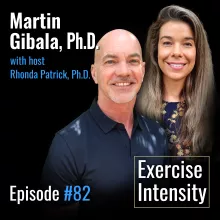Episode shownotes
Dr. Martin Gibala is a muscle physiologist, professor, and kinesiology department chair at McMaster University in Hamilton, Ontario, Canada. He is best known for pioneering research on the health benefits of high-intensity interval training (HIIT) and his profound understanding of HIIT's physiological mechanisms. He is a co-author of the book "The One-Minute Workout."
In this episode, we discuss:
- (00:00) Introduction
- (11:00) What is high-intensity training?
- (11:53) Zone 2 vs. HIIT for VO2 max — which is better?
- (13:22) The vital role of vigorous exercise
- (14:40) Why VO2 max matters for longevity
- (17:45) Why athletes vs. exercisers benefit from different intensity distributions
- (22:09) Measuring maximum heart rate and VO2 max
- (30:31) How the heart adapts to HIIT to increase VO2 max
- (35:47) Why vigorous exercise accelerates mitochondrial adaptation
- (40:06) Enhancing fat oxidation and mitochondrial growth with vigorous exercise
- (44:22) How intensive exercise boosts fat breakdown
- (45:56) Is high-intensity exercise better for autophagy than fasting?
- (55:15) Exercise snacks
- (57:55) Why 'choosing the stairs' reduces early death (VILPA study)
- (1:00:39) Protocol for VO2 max
- (1:05:50) The effect of HIIT on muscle fiber types
- (1:10:18) How aging effects muscle fibers
- (1:14:09) Does high-intensity training produce an "afterburn effect?"
- (1:16:13) Why vigorous workouts are better for BDNF and cognition
- (1:23:15) Anti-metastatic cancer effects
- (1:50:23) Wingate training vs. reHIIT — a comparison of protocols
- (1:55:38) Perceived exertion vs. HRmax
- (1:59:23) Interval walking for people with type 2 diabetes
- (2:01:06) Contraindications of HIIT
- (2:05:06) Why preconditioning reduces risks from exercise
- (2:10:44) Can resistance training be a type of aerobic exercise?
- (2:16:24) Does cardio and strength training interfere with each other?
- (2:18:45) How many minutes per week of high-intensity training?
- (2:26:58) Are there sex differences and misconceptions in high-intensity training, for women?
- (2:27:42) Should post-menopausal women do H.I.I.T.?
- (2:27:47) Does intense exercise raise cortisol?
- (2:34:16) Bone density and osteoarthritis
- (2:36:40) Atrial fibrillation risk
- (2:39:20) Hypoxic training and blood flow restriction
- (2:40:45) Tips for training with joint issues
Show notes are available by clicking here
Join over 300,000 people and get the latest distilled information straight to your inbox several times per month: https://www.foundmyfitness.com/newsletter
Become a FoundMyFitness premium member to get access to exclusive episodes, emails, live Q+A’s with Rhonda and more: https://www.foundmyfitness.com/premium
Learn more about the premium podcast The Aliquot: https://www.foundmyfitness.com/aliquot
